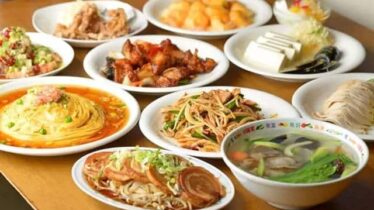30 Meaningful Chinese Girl Names from Professional Mandarin Teachers
Let us bring it closer to you today and introduce you to some beautiful Chinese girl names for your child! When looking for Chinese names to give your child (or when wanting to decide on a Chinese name for yourself!), you will probably be a little confused at first if you do not speak the language. Where to start? In Chinese names, which syllable is the surname, which one the first name? Foreigners struggle to understand the system behind Chinese names, because it is a little different to the names in the western world.
The structure of Chinese names
In Chinese culture, names consist of a family name 姓 (xìng) followed by a given name 名 (míng). Most Chinese names have three syllables, with the first syllable being the surname.
Surnames in Chinese
Unlike Western naming conventions, Chinese names start with the family name. For example, “Sarah Wilson” would be called “Wilson Sarah” in Chinese.
Chinese is a monosyllabic language, where each syllable corresponds to a unique character or sign. There are no spaces between syllables in written Chinese names.
The family name is inherited from the father and cannot be chosen. It typically consists of a single syllable. The most common surnames in mainland China are Li (李), Wang (王), and Zhang (张), shared by over 270 million people due to a limited number of available surnames.
Read more:
First names in Chinese
Now, let us get to the part of Chinese names you can actually decide on. As mentioned, most Chinese names on the whole have three syllables. The first is the surname, which means the other two syllables following are free for you to decide. Now, it is not a must that the name of every Chinese person is trisyllabic, but definitely the norm. But you will hear the names of some Chinese people only have two syllables (the surname + another syllable chosen).
How do Chinese parents decide on the characters they want to bless their child with? Many factors play a role in the choice of a given name. Of course, it should have a positive connotation. Chinese names tend to have great meanings and are rich in spirit. Different to surnames, which are shared by many people, the first names of people vary a lot. That is, whilst you encounter many Sarahs, for Chinese people it is rather unlikely to encounter a person whose name has the exact same two syllables like one’s own.
However, there are tendencies for certain characters to be chosen more frequently among Chinese names and repeat quite a lot. Some parents choose names according to their hopes for their children, such as Kang (康), healthy, Yong (勇), brave, or Mei (美), beautiful.
Differences when it comes to gender?
Are there differences in gender? Yes and no – whilst in principle characters can be chosen freely regardless of the gender, some characters such as Měi (美) are restricted exclusively to girls, whilst Míng (明) is a character present mainly in names for boys, though it is not true that a girl cannot carry Míng (明) too as one of the syllables in her name. In general, there is no overall rule for this, but there definitely exist some advice for choosing characters appropriately.
How to choose good Chinese girl names
Choosing a Chinese girl names is an important process focused on conveying positive meanings and pleasant sounds. Parents wish to cultivate virtues like beauty, intelligence, grace, and strength through the name’s characters and their auspicious origins. Great care is taken to select characters representing noble qualities that can manifest in the child’s life journey.
Equal attention is given to how the name sounds when spoken aloud. A Chinese girl name should be a melodious composition, with the different character sounds and tones blending together harmoniously. Dissonant character combinations or awkward pronunciations are avoided, as the name becomes a lifelong identity proudly carried.
The ideal Chinese girl name balances profound positive meaning with an aurally pleasing rhythm and flow. When meaning and sound come together seamlessly, the chosen name becomes an elegant embodiment of the hopes and blessings the parents have for their precious daughter’s future.
Chinese Girl Names: Considerations and Words to Avoid
Before we provide you with a list of some wonderful Chinese girl names, first you may note two other points: Whilst there exist monosyllabic and disyllabic first names, it is unlikely that names are an actual word already existing. For example, Míngtiān (明天), meaning “tomorrow”, is made up of two powerful signs, Míng (明) – bright – and Tiān (天) – sky/the above – yet people may find it weird to name their child after a word frequently used in everyday life (“tomorrow”), though it may not be excluded, for this name actually was chosen for a main character in a show. Yet, it may likewise be weird to choose Dēng (灯) – lamp- as a syllable in a name, and whilst Cǎoméi (草莓) sounds beautiful, it means “strawberry” and should be excluded, just like you would not name your child Shūcài (蔬菜) – vegetable!
30 Chinese Girl names listed for you
Finally, let us provide you with some beautiful Chinese girl names, whereby we prefer monosyllabic words to disyllabic ones, simply because we believe you could actually combine two characters yourself that you find to be a perfect match! Remember that, if you should speak Chinese, you can go ahead and choose any other character you like not on the list today. In this case, however, we advise you to make sure that this character would work as a name and is not at odds with Chinese names. You may ask a Chinese person about it or do some more research on it. Now, there you go!
GoEast Mandarin Classes for Kids
- ✨ All language levels
- 🎮 Learning by doing & play
- 🌍 All online, all timezones
One character Chinese girl names:
- Ling (玲)– “Tinkling of Jade”; conveys delicacy and preciousness.
- Qian (倩)– “Pretty”; a commonly used character in girls’ names for its beauty-related meaning.
- Yue (月)– “Moon”; signifies brightness and purity, often used in names to symbolize quiet beauty and grace.
- An (安)– “Peace”; represents tranquility and stability, a desirable quality in many cultures.
- Lan (兰)– Meaning “orchid,” this name symbolizes beauty, elegance, and grace.
- Mei (美)– Translates to “beautiful,” a common choice for expressing the wish for one’s daughter to possess beauty.
- Fang (芳)– Signifies “fragrant” and is associated with good character and virtue.
- Hong (红)– Means “red,” a color associated with happiness and prosperity in Chinese culture.
- Qiu (秋)– Represents “autumn,” a season often linked to harvest and abundance.
- Hui (慧)– Means “wise” or “intelligent,” often chosen to reflect the hope for wisdom.
- Yan (燕)– Refers to the “swallow (bird),” symbolizing hope and the coming of spring.
- Lei (蕾)– Means “bud,” as in a flower bud, symbolizing potential and new beginnings.
- Zhu (珠)– Means “pearl,” symbolizing preciousness and rarity.
- Qin (琴)– Refers to the “guqin,” a traditional musical instrument, representing artistry and culture.
- Lu (露)– Means “dew,” often used to signify freshness, purity, and a new start.
- Min (敏)– Signifies “quick” or “clever,” often chosen to reflect a wish for intelligence and acuity.
- Ning (宁)– Means “peaceful,” a desirable quality and a common wish for a tranquil life.
- Tao (桃)– Means “peach,” a symbol of longevity and often associated with immortality in Chinese mythology.
- Jing (晶)– Means “crystal,” signifying clarity, brightness, and value.
- Dong (冬)– Means “winter,” symbolizing calmness, endurance, and a quiet strength.
Two characters Chinese girl names:
- Lihua (丽华)– Li translates to “beautiful” or “elegant,” and 华 (Huá) means “splendid,” “magnificent,” or can refer to China itself.
- Xiaoyu (小雨)– “Little rain,” symbolizing nourishment and freshness.
- Biluo (碧洛)– “Jade River”; combines elements of nature and preciousness, representing purity and strength.
- Xueqin (雪琴)– “Snow Zither”; symbolizes rarity and artistic talent, reflecting elegance and purity.
- Lirong (丽蓉)– “Beautiful Lotus”; the lotus is a significant symbol in Chinese culture, representing resilience and beauty.
- Shuairuo (帅若)– “Handsome, as if”; a unique name that combines elements of aesthetics and comparison, rarely used for girls.
- Fenghua (风华)– “Breeze and Splendor”; signifies elegance and extraordinary character, reflecting a unique presence.
- Zhenzhu (珍珠)– “Pearl”; though pearls are common in names, this direct use is rare and symbolizes rarity and value.
- Baili (白丽)– “White beauty,” representing purity and elegance.
- Feifei (菲菲)– This name often denotes elegance and lightness, with a possible meaning of “luxuriant.”
Trends for Chinese Girl Names
Chinese girl names have also seen a transformation, moving away from once-popular choices like “嘉欣(Jiā Xīn),” which means “happy and beautiful.” Instead, names that convey grace, beauty, and nature, such as “沐瑶(Mù Yáo),” “玥(Yuè),” and “一诺 (Yī Nuò)
,” are now in vogue. For example, “沐瑶,” which combines elements of nature and preciousness, was the most popular name for newborn girls in Hefei in 2022. In Hangzhou, “玥,” meaning “precious jewel,” “一诺,” signifying “a promise,” and “昕玥(Xīn Yuè)
,” which combines the ideas of brightness and preciousness, were among the top choices. This trend reflects a preference for names that are melodic, carry a sense of elegance and sophistication, and often use characters with rich, positive meanings.
Additionally, the rise of single-character names like “玥” and “瑶” indicates a trend towards simplicity and depth in naming conventions. Parents are choosing names that are easy to remember yet profound in meaning, reflecting a desire for their daughters to embody these qualities. This shift may also be influenced by a growing interest in cultural heritage and an appreciation for names that are both traditional and timeless. As Chinese society continues to evolve, these naming trends highlight the blending of modernity with a deep respect for cultural roots, illustrating how parents’ choices are shaped by both contemporary values and historical influences.
Reference: 「2023新生儿名字风向标」
Read More about Naming in Chinese
Post: 40 Authentic Chinese Boy Names Recommended by Mandarin Experts
Post: The Complex Traditions and Meanings Behind Chinese Names
Post: Fruit names in Mandarin Chinese
Post: Pokémon by their Mandarin Chinese names
Post: How to choose a Chinese name
Post: How Do Chinese People Choose English Names?








